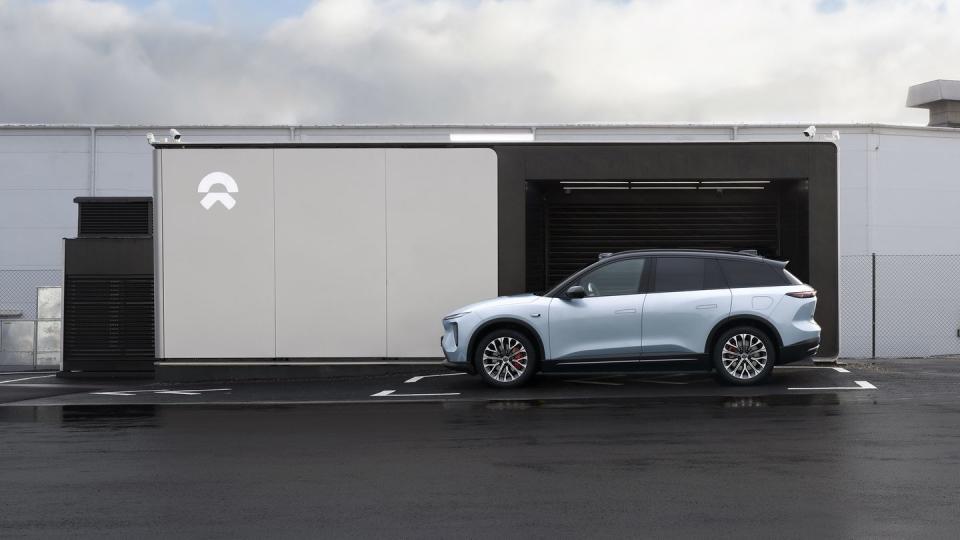EV Battery Swap Stations Are Gaining Momentum in Europe and Asia

Nio opens 30th EV battery swap station in Europe after launching sales on the continent, with over 2200 stations now active globally.
The battery swap stations, resembling a small car wash, automatically switch out batteries from underneath an EV in just a couple of minutes, while storing and recharging several other batteries inside.
Automakers Geely and Changan have signed on to Nio's battery swap technology and will develop EVs and trucks that will offer this feature.
Nio's battery swap system, able to automatically replace batteries in EVs in just a couple of minutes, at one point may have seemed like a very elaborate but ultimately dead-end technology, one that required vast investments to work on any significant scale for consumers.
The development of ever-faster conventional charging stations seemed far more promising, and far less expensive from the standpoint of the infrastructure required.
But battery swap stations are now gathering momentum in Europe, and Nio is no longer the only one betting on them.
By the end of November of this year Nio has opened 30 such stations, roughly resembling a small car wash, in five countries in Europe as part of its EV wave. Globally, the stations now number 2217—about double the number of conventional charging stations Electrify America has in the US, to put that number in perspective.
What's more, the breakneck pace of battery swap building efforts occurred on a much more compressed timescale than many charging networks' own charging station building efforts in North America, and that's given the complexity of all the hardware inside each station.
Nio's battery swap station network in Europe and Asia now performs an average of 60,000 swaps per day, with the vast majority in China.
Clearly, Nio does not believe this technology is a passing fad. And neither does Volvo and Polestar parent company Geely along with truck maker Changan, which have signed on to Nio's technology.

To build its network of battery swap stations in Europe, Nio has opened a factory in Biatorbágy, Hungary, allowing it to assemble station components locally for use within the EU.
The current geographic spread of battery swap stations covers popular routes between large cities, including Amsterdam to Munich, and Hamburg to Oslo. The two latest stations were opened in November in Malmö and Arlandastad, Sweden, with both able to perform 408 swaps per day while storing up to 21 batteries.
The creation of a partnership with Geely and Changan—both major players in the Chinese car and truck market—is aimed at developing two battery swap standards for private cars and for commercial vehicles. More importantly, Geely and Changan will both develop battery swappable vehicles that will be compatible with battery swap stations.
"As a leading company in the Chinese automotive market, Geely Holding's rapid development in the new energy field is impressive," said William Li, Founder, Chairman and CEO of Nio. "This strategic partnership will further popularize battery swapping, bring quality and convenient battery swapping experience to more users, and contribute to the steady development of the smart EV industry."
It's still too early to tell just how wide Nio's battery swap appeal will be in Europe, where the brand has been making considerable sales progress. At some point, other automakers with EV models in Europe could be tempted to join Nio's standard to offer owners of their vehicles this flexibility, which could become as big of an infrastructure advantage as Tesla's Supercharger network is today.
After all, Tesla began working on its network over a decade ago as an exclusive feature offered to its EV customers, before reaping the benefits of sharing the chargers with EVs from other brands.
It remains to be seen how wide a phenomenon battery swap stations will become in Europe, but it's clear that EV buyers in China are on board.
Will battery swap stations grow in popularity through the rest of the decade, or will DC fast-charging stations eventually make this approach moot? Let us know what you think in the comments below.

 Yahoo Autos
Yahoo Autos 